Inside the Robodebt stitch-up of former PM Scott Morrison
On the Robodebt findings about Scott Morrison, the weight of evidence is against the royal commission and with the former PM.
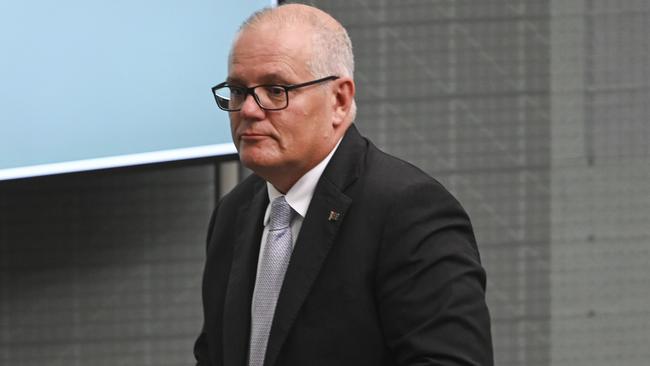
The attack is led by Government Services Minister Bill Shorten, defeated by Morrison at the 2019 election. Shorten has invaluable political ammunition in the findings against Morrison arising from Robodebt royal commissioner Catherine Holmes, former Queensland chief justice.
Shorten did not miss. “The real victims were those who suffered financial hardship and had to sell their possessions to pay an unlawfully raised debt,” he told parliament this week. “The real victims were those who suffered trauma, anxiety, distress.”
Moving to his denouement with Morrison his target, Shorten said: “But one person who is not a real victim is the member for Cook”, whom he described as “a bottomless well of self-pity and not a drop of mercy for all of the real victims of Robodebt”. Anthony Albanese fuelled the pile-on, saying Morrison had suggested “there was only one victim of Robodebt: him”.
By the week’s end Shorten turned his wrath on Peter Dutton, in effect saying the Opposition had to choose between Morrison and accepting its responsibility for Robodebt. “Cut him loose, or he will damage the whole Liberal herd,” Shorten demanded, and many Liberals probably felt the same.
By resurrecting the Robodebt debate, Morrison proved the Opposition has lost irredeemably the politics of this issue. Robodebt, as the royal commission demonstrated, is a profound failure of government that unfairly punished many Australians. It will hang around the Opposition’s neck for years.
In his statement to parliament, Morrison was not defending Robodebt. He accepts the failure of the scheme and began his remarks expressing “deep regret”. Albanese’s claim that Morrison suggested he was the only victim of Robodebt was false. But it doesn’t matter. The royal commission sanctions Labor to say virtually whatever it likes about Morrison.
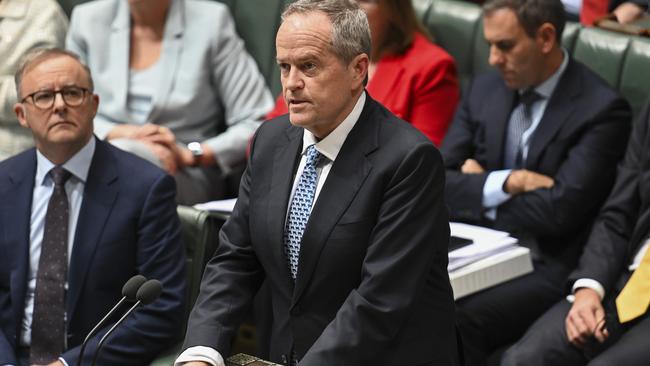
The royal commission targeted Morrison with much political responsibility for Robodebt and made specific findings against him. But this is not a judicial process. When royal commissions are recruited for political goals their reports demand scrutiny and are never beyond challenge. If Morrison had still been prime minister the findings would have forced his resignation. They are serious and Morrison rejects the findings – about him. The story this week, essentially, is that Morrison’s defence is unworthy of appraisal. His defence was dismissed as self-pity. Case closed. This is the mob mentality of contemporary life. Once someone is discredited, no alternative narrative is to be tolerated.
The royal commission made three accusations against Morrison – that as minister he allowed cabinet to be misled in creating the scheme; that he gave untrue evidence to the royal commission; and that his drive to find budget savings constituted such pressure on senior public servants that it “explained” their failure to give frank and full advice to ministers.
At their least, the findings about Morrison – as distinct from conclusions about the Robodebt scheme – are contentious. To be more frank, they look like an old-fashioned Australian stitch-up.
The report reeks of unjustified conclusions, ideological fixation and ignoring the basics of cabinet decision-making. The conclusions about Morrison are a case study in the limits and flaws of royal commissions and the fallibility of lawyers, not just of politicians.
Morrison became social services minister in December 2014 when officials from the separate Department of Human Services had been working for about six months on what became known as Robodebt. He left the portfolio after nine months in September 2015 before the scheme was operational.
On March 25, 2015, Morrison took to cabinet’s expenditure review committee a budget submission for the 2015-16 budget. There was an accompanying green brief from the finance department on all measures. The submission constituted a new policy proposal for Robodebt and it contained a due diligence checklist prepared by the department. In answering the question “Is legislation required?” the answer was no.
Nothing could have been clearer. There was no ambiguity about the departmental advice.
Years later it emerged the advice was wrong. The scheme as presented was not legal; new legislation was necessary. This was never an issue in public debate when the government proceeded with the scheme. But the royal commission invested an immense effort on what it claimed was Morrison’s failure in the ERC at the time. It concluded Morrison was “not entitled” to rely on the Department of Social Services legal opinion when he put the submission to cabinet.
At face value, this is an extraordinary position to take.
The royal commission, purporting to lecture on how cabinet should work, said Morrison’s “proper administration of his department” required that he make inquiries of DSS because at an earlier stage it had expressed the opposite opinion. Hence the conclusion, Morrison, as a former treasurer and prime minister, is found by the royal commission as social services minister to have “allowed cabinet to be misled” because he did not make the “obvious inquiry”.
Morrison is found guilty because he didn’t ask a question the royal commission says he should have asked. Just think about that. Cabinet submissions are the final resolution of earlier views and reflect adjusted policies. Conscious of the wording of its finding against Morrison, the royal commission doesn’t say he “misled” the cabinet – it wouldn’t go that far – but it settled instead for the finding that his failure to ask a question meant he “allowed” cabinet “to be misled”.
It sounds tortuous because it is tortuous. This is a grave charge. Presumably there is retrospective awareness of Morrison’s misleading. Has any cabinet minister laid this accusation against him? No. Has any public servant? No. Did any witness before the royal commission? Not as far we know. When the scheme was announced did the Labor Party opposition claim it was illegal? No. If the secretaries of the departments of Social Services and Human Services believed the scheme was unlawful at the time of the cabinet submission does anyone doubt they would have raised the alarm? They didn’t.
Just the opposite. Department of Social Services secretary Finn Pratt and Department of Human Services secretary Kathryn Campbell attended the ERC meeting. The cabinet submission and its view on the scheme’s legality had their authorisation.
Morrison said on Monday he was “constitutionally and legally entitled” to assume the officers of his department had properly discharged their duties in giving him this advice. That seems a statement of the obvious. The royal commission, however, knows better. It believes he wasn’t entitled to assume this.
The royal commission asserts Morrison should have realised the advice was faulty. He should have asked more questions.
For a royal commission to find a former prime minister allowed cabinet to be misled, one would expect some claims or leading evidence to be identified and mounted. Where are the witnesses? Who made the claims? Amid the thousands of documents before the royal commission does any document show such misleading by Morrison? As far as is known, no witness, no public servant, claimed Morrison had been told legislation was needed at the time of his submission to the ERC saying the opposite.
Yet Morrison, the royal commission says, should have known better. This sounds like an assessment in retrospect.
The cabinet context is important. The Social Services 2015-16 budget submission contained 51 new policy proposals. And Robodebt was not the main item. Its savings were estimated at $1.2bn from the overall portfolio budget of $137bn. The due diligence checklist recommended new legislation in more than 30 of the 51 cases. Obviously, there was no lack of willingness to recommend new legislation when seen as necessary.
Lectures from lawyers about cabinet should come with warning signs. The cabinet does not appear in the Constitution. It is a political creation. It functions by convention. Its procedures are governed by rules authorised by cabinet itself. The royal commission, however, quotes the Cabinet Handbook to the effect that cabinet submissions should provide “enough detail on risk and implementation” to allow cabinet to make an “informed decision” in order to make its finding against Morrison.
The truth here is something many lawyers have trouble accepting – cabinet ministers are the only authoritative sources in making judgments about whether proper processes were followed in cabinet.
The issue is not whether the submission was correct. Everybody now knows the scheme was illegal and the departmental advice was wrong. It took years for this serious mistake to be exposed. It is hard reading the report not to conclude it takes an assumption we now know to be true and reinterprets the events of 2015 on this basis. There was no public debate in 2015 or 2016 suggesting the scheme was illegal.
The hook on which the royal commission rested much of its case was a 17-page February 2015 executive minute, sent to Morrison for action, outlining nine options for “protecting the integrity of the welfare system outlays”. The minute said “fraud and error are significant problems” at a potential cost of $3.6bn yearly. Recovery of overpayments was important.
One option involved the use of Australian Taxation Office data to determine overpayment of welfare benefits with an estimated $1.2bn savings. Advice from the DSS said “legislative change would also be needed to implement this initiative”. Morrison on February 20 signed the minute. He circled “pursue” on several of the recommendations including for what finally became Robodebt.
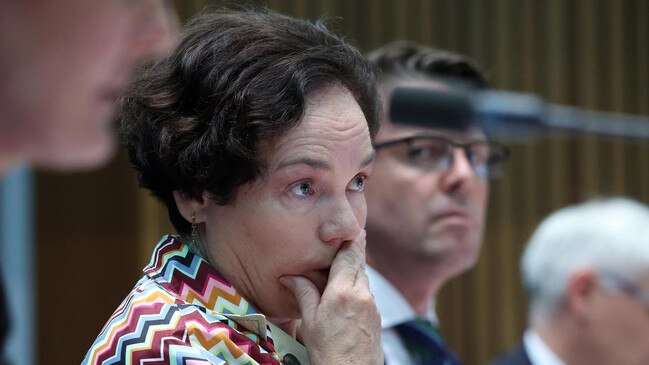
Morrison was not authorising a specific Robodebt scheme. Much work needed to be done. This was an “iterative” process, as the deputy secretary of the DSS said. The opening page of executive minute recommended Morrison agree “to the development of a package”. That’s what he did.
The final cabinet submission differed from the executive minute. This followed interaction and differences within and between the two departments, DSS and DHS, as documented at length in the royal commission report. The critical omission was an internal DSS legal advice from late 2014 saying the method of income averaging being considered was flawed, illegal and could not be defended in a tribunal or court.
Incredibly, such advice seemed never to be properly communicated through the bureaucratic process. Morrison told the royal commission that the departments should have given him the initial 2014 DSS legal advice. The royal commission agreed. Morrison said he was unaware of the existence of this 2014 legal advice and became aware of the advice only years later when preparing his submission for the royal commission. Departmental officers confirmed in evidence Morrison was not given the legal advice at any point when he was minister.
In a May 2020 cabinet submission the DSS advised (the then Morrison government) that at no time before the decisive 2019 opinion of the Solicitor-General – that the scheme was illegal – had the department given advice to any of the subsequent social services ministers that the scheme was unlawful.
It is extraordinary that the DSS maintained the same position – that the scheme was lawful – across the four years from 2015 and four subsequent tranches of cabinet submissions involving Christian Porter and Alan Tudge as ministers. The same advice was given repeatedly to cabinets.
There is no question the department failed to give Morrison the accurate advice he needed in 2015 to discharge his duty as minister at the scheme’s inception. Marise Payne, as human services minister, had the same experience – she became aware of concerns about the Robodebt scheme only after she finished up as minister.
If the department had given correct legal advice at the start then Robodebt would not have proceeded or would have proceeded in a very different way. It is virtually certain Morrison would not have put any new legislation to parliament given the disastrous fate of so many of the 2014-15 budget measures.
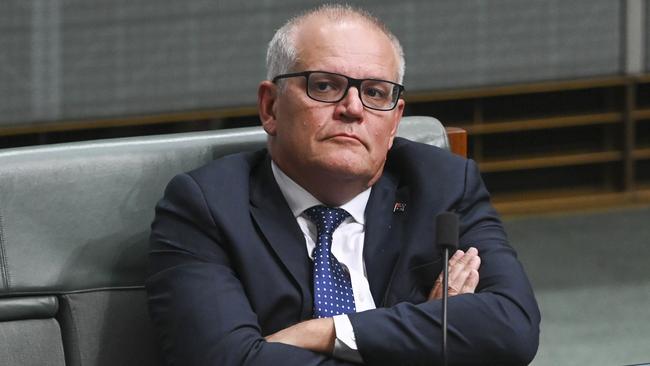
The royal commission found DHS head Campbell should have been aware the cabinet submission was misleading because it contained no reference to income averaging and made no reference to the need for legislative change. When pressed on this, Campbell said it was an “oversight”, but the royal commission declined to accept this excuse and found against her.
In relation to Morrison, the royal commission seized on the difference between the earlier executive minute and the cabinet submission. It said because the cabinet submission “represented a complete reversal of the legal position without explanation” then Morrison was not entitled to accept it.
This is nothing but a highly opinionated assertion by the royal commission. This is no evidence to sustain this claim. Morrison told the parliament about the cabinet submission: “Such advice superseded all prior advice including the earlier executive minute.” Again, this was obvious. It is why cabinet exists as the ultimate decision-making forum. The purpose of the checklist is to assure the minister all proper processes have been followed.
The impression one gets from the royal commission report is that having forensically exposed an extraordinary failure in bureaucracy and administration, it felt the circle must be closed by insuring political accountability was sheeted home to the cabinet minister putting the originating cabinet submission.
The report also rejected as “untrue” Morrison’s claim he was told that income averaging was an established practice followed by the Department of Human Services. In his June 6 submission to the royal commission, Morrison listed several direct, supporting references for his position and said there was a “reasonable likelihood” such views would have been conveyed to him at the time.
The royal commission was unpersuaded. Morrison was unable to point to any written briefing he had received on income averaging in 2015. He was unable to nominate which officials told him this at the time. Moreover, senior officials from the DSS had no knowledge of such a practice by the DHS and were opposed to its adoption. Morrison rejected the commission’s finding by relying on the argument it had reversed the onus of proof – requiring him to prove what he said was true.
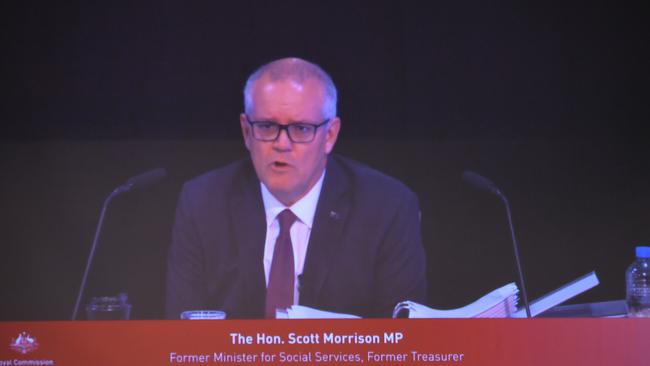
Morrison, however, was on far firmer ground in rebutting the royal commission’s most extraordinary claim against him – that Morrison’s commitment to “ensuring welfare integrity”, calling himself a “welfare cop on the beat” and driving to get budget savings constituted unacceptable pressure on the departments.
The report said: “The failure of DSS and DHS to give Mr Morrison frank and full advice before and after the development of the (new policy proposal) is explained by the pressure to deliver the budget expectations of the government.”
This is beyond absurd. Every department faced such pressure. Every minister was seeking savings. The Abbott government policy on which it was elected was to reduce the budget deficit. The social services and welfare budget, estimated in 2015-16 at $154bn, was easily the largest portfolio spend. Senior officials understood the need to pursue integrity issues. That is their job. The royal commission seemed unable to grasp this. Such work was under way before Morrison became minister.
The royal commission brought an ideological framing to its task. At the outset, it said: “An enthusiasm for savings would seem an anathema to the underlying policy and rationale for social security spending.” It reported public servants felt under pressure. Of course they felt under pressure – they are supposed to feel pressure at budget processes.
The conclusion that Morrison was to blame for the failure of the public service to offer frank and fearless advice is arbitrary and confected.
Nobody doubts Morrison was a pushy minister. But there is no convincing evidence for this finding. It reveals far more about the royal commission’s mindset than it does of Morrison’s.
In many respects the commission has produced a forensic and highly valuable report on Robodebt. But on one specific issue at least – its findings against Morrison – the weight of evidence is largely, though not wholly, with Morrison and against the royal commission.



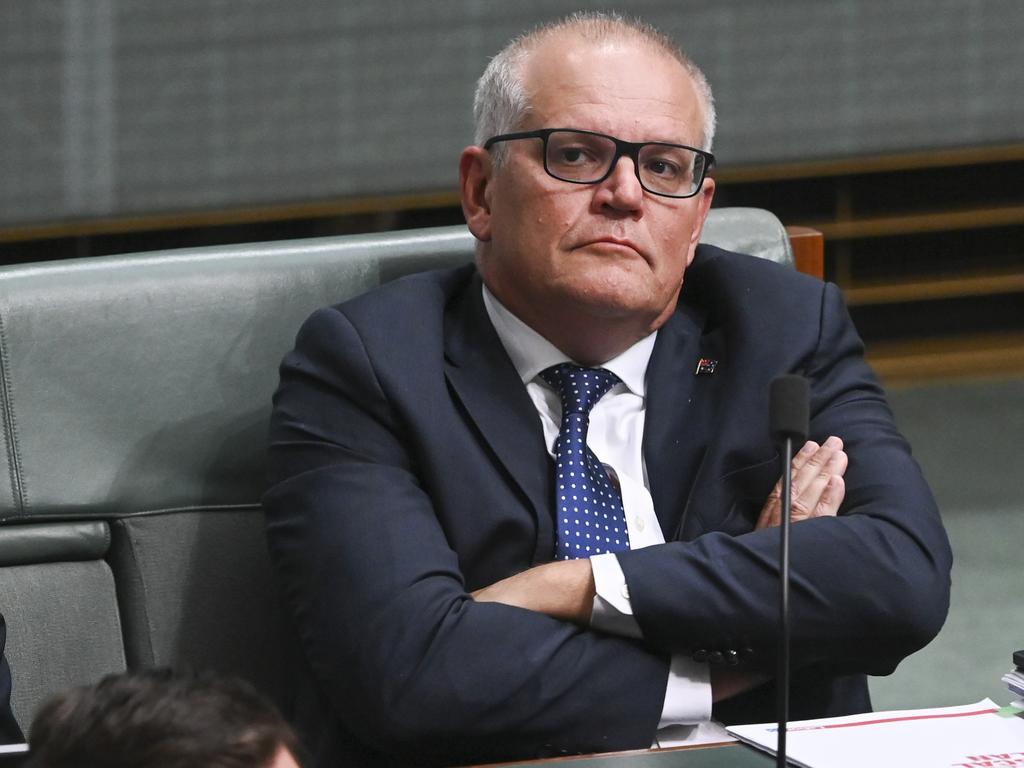




Scott Morrison is a political outcast. Many of his own side want him gone from parliament. Now he is the focus of Labor’s onslaught over Robodebt, having provoked massive political retaliation from the Albanese government.